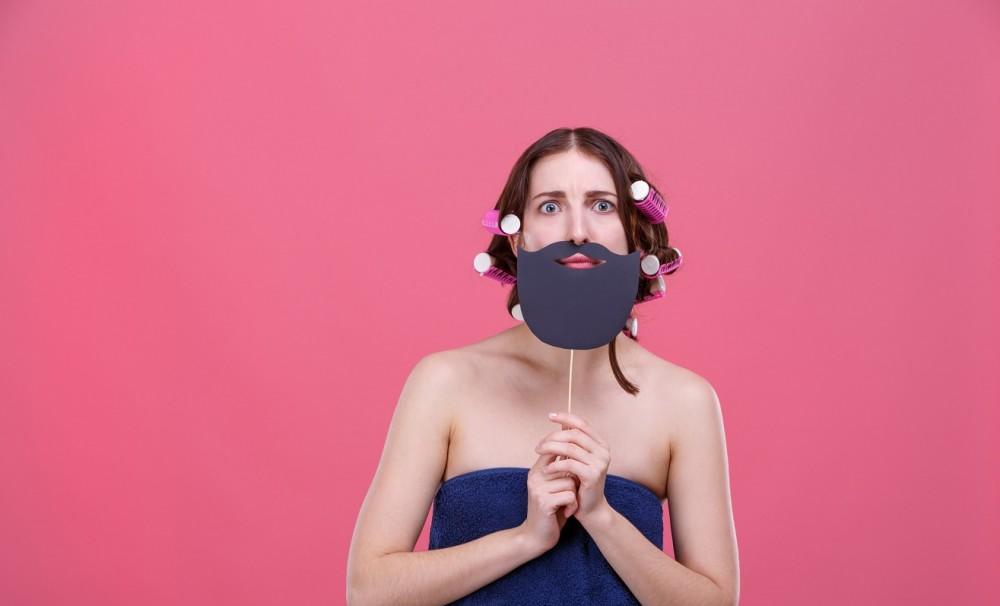Author: Zuo Yagang (Peking Union Medical College Hospital)
1. What are the symptoms of hirsutism?
Changes in appearance: increased hair, acne (pimples), hair loss, facial obesity, bulging back muscles.
Virilization: thicker tone, clitoral hypertrophy, glabrous breasts and facial sides.
Female reproductive system: shortening of menstrual periods, menstrual disorders, amenorrhea, infertility, uterine bleeding.
Breast: nipple discharge, female breast failure to develop.
Precocious puberty in children: axillary hair, pubic hair early onset.
Decreased or absent libido.
High blood pressure, abnormal blood sugar, purple streaks on the skin.

Image source: Stand Cool Helo
2. What are the common causes of hirsutism?
Hirsutism is often caused by excessive secretion of male hormones from the ovaries and adrenal glands or the body's sensitivity to androgens, which increase the secretion of male hormones, androgens have the effect of increasing the size of hair follicles, thickening hair, and hair growth in hormone-sensitive areas, resulting in hairy symptoms.
Idiopathic hirsutism
Female patients with hirsutism have no obvious cause and normal androgen levels, which can occur during menopause and pregnancy, aggravate the condition during pregnancy, and some symptoms can subside after childbirth.
Non-neoplastic ovarian disease
Predominantly seen in polycystic ovary syndrome.
Neoplastic diseases
Tumors that occur in the ovaries, adrenal glands, respiratory tract, digestive tract, etc. can cause androgen levels to rise.
Pituitary factors and hyperfunction and hyperplasia of the adrenal glands
Liver factors
A protein produced by the liver that binds to serum male hormones decreases, resulting in excess of free male hormones.
Drug factors
Use adequate amounts of androgens, such as dihydrotestosterone, methyl androgenede glycol, 19-noresterone, etc.
Some oral contraceptives can cause hirsutism.
Glucocorticoids, immunosuppressants cyclosporine, etc.
Cushing syndrome
Who is susceptible to hirsutism?
Hirsutism can occur in women at all stages, polycystic ovary syndrome is more common in adolescent women, and women of childbearing age and menopause are mostly caused by tumors.
4. What situations do I need to seek medical attention in time?
Symptoms related to hirsutism, such as increased hair and acne, require early medical attention.
5. How does a doctor diagnose hirsutism?
Doctors ask the patient in detail about symptoms, a medical history, and a detailed physical examination to confirm the diagnosis with serum sex hormone tests, the Ferriman-Gallwey scale, and imaging tests.
Serum sex hormone tests: to find out if there is true hirsutism, evaluate menstruation, and identify androgen sources.
Ferriman-Gallwey Scale: Grading hair growth.
Abdominal, pelvic ultrasound, or CT: to know if there are adrenal, ovarian, and gastrointestinal tumors.
CT or magnetic resonance imaging (MRI) of the skull: to understand the pituitary gland.
Lipids, liver and kidney function, ecglyogram: to assess cardiovascular risk.
6. What questions may the doctor ask the patient?
Has anyone in the family ever had an ovarian or adrenal-related disease?
At what age do you start to have hairy symptoms? Where do you grow hair?
Do you have pimples? Hair loss?
Are menstruation normal? What is your menstrual flow? Is the menstrual cycle stable?
Do you take the medication for a long time? Such as hormones and cyclosporine?
Have you ever had your endocrine checked before?
Have you applied hormone ointment?
What about blood pressure? Is my blood sugar normal?
7. What questions may the patient ask the doctor?
What is hirsutism?
Why is there hirsutism?
What tests do I need to do to confirm the diagnosis?
What treatment is available?
Are there any adverse effects of medical therapy?
What do I need to pay attention to in life?
Is it possible to relapse after treatment? Are there any precautions?
8. How to treat hirsutism?
Treatment is primarily for the cause and includes pharmacotherapy, topical therapy, and physical therapy.
drug therapy
Oral contraceptives and antiandrogen drugs: may lower androgen levels.
Oral glucocorticoids: used to treat hyperandrogenemia with hyperandrogen hyperabolic adrenal synthesis, such as dexamethasone and prednisone.
Other treatments
Topical eflornithine treatment: not currently listed in China.
Laser and strong pulsed light: It is currently difficult to remove all hairs, but it can reduce, thin and lighten the general hair, which is good for the treatment of dark hair. However, there is a risk of adverse reactions such as pigmentation and scarring.
Electrical hair removal: A fine needle is inserted into the skin hair follicle and directly destroys the hair follicle, which can achieve the effect of permanent hair removal.
Surgery: removal of the diseased ovaries or removal of the tumor if necessary.
bibliography
ZHU Xuejun. Dermatology (2nd edition)[M].Beijing:Peking University Medical Press,2015:1135.]
*The content of this article is a popularization of health knowledge and cannot be used as a specific diagnosis and treatment recommendation, nor is it a substitute for face-to-face consultation by a practicing physician, for reference only.
*The copyright of this article belongs to Tencent Medical Code, unauthorized media reprinting is prohibited, and illegal reprinting will be investigated for legal responsibility according to law. Individuals are welcome to forward to the circle of friends.
* Welcome to WeChat search and pay attention to the public account "Tencent Medical Code" to get more health science knowledge.